Bourke Ulick J. Easy lessons, or Self-instruction in Irish / Легкие уроки: самоучитель ирландского языка
Подождите немного. Документ загружается.

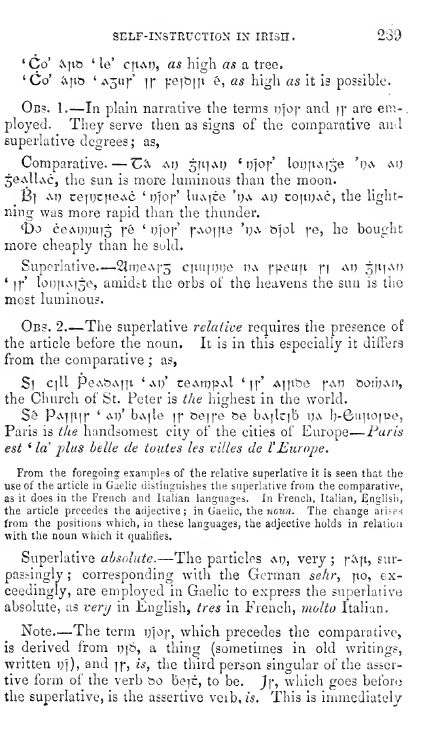
SELF-INSTRUCTION
IN IRISH.
239
'Co'
^|i&
'
le'
cfiAr),
as liigh
as
a
tree.
'Co' ixjtfc)
'
A3U}*'
n*
]:e]b]|i
é,
as high
as
it
is
possible.
Ob5.
1.
—In plain narrative the terms
vi\ox
and
yy
are
em-,
ployed.
They
serve then
as signs of the
comparative
and
superlative
degrees;
as,
Comparative.
—
'Civ At)
5tMAt;
*r)io|*'
loT)|tv\|5e
'r;<\ ai)
jeAllAC,
the sun is more luminous than the moon.
Bl
At)
cejUCfteAC
'
tjíof'
liiA^ce
'rjA ai) co|ti)AC,
the
light-
ning
was
more rapid than the thunder.
i)o
ceAi;t)U|3
1*6
'
vi\o\' |*AOi|ie
'ua
ty\o\
fe,
he
bought
more cheaply than he
sold.
Superlative.
—
2in7eAr5
cjniiui^e
t)a
|*peu|i
|*i
at)
5^1
ad
'
yX
loi}ftAi3e,
amidst the
orbs of
the
heavens the
sun
is tiie
most
luminous.
Obs.
2 The
superlative relative
requires the
presence
of
the article
before the noun.
It is in this especially
it
diíFers
from the comparative
;
as,
Si
c\\\
PeAbA]|i
'at/
ceAtD^Al
'if'
A]|tbe
fAt)
boujAi),
the
Church of St.
Peter is the highest in the
world.
S&
PA^ftif
'
at/
bA]le
If
beife
be
bAilcib
i;a
b-Bujioipe,
Paris is
the handsomest
city of
the cities of Europe
—
Paris
est 'la'
j^liis belle cle
tuutes les villes
de V
Europe.
From
the foregoing examples
of the
relative superlative it
is seen that the
use
of
the article in
Gaelic liistinguishes
the
superlative from
the comparative,
as
it does
in the French and Italian
languages. In French,
Italian, English,
the
article
precedes
the adjective
; in
Gaelic, the
noun.
The change arises
from
the positions which,
in these
languages, the adjective
holds in relation
with
the noun
which
it
qualifies.
Superlative absolute.
—The particles At),
very
;
fivjt,
sur-
passingly
;
corresponding
with
the German sehr, |io,
ex-
ceedingly,
are
employed
in
Gaelic
to express the superlative
absolute, as very
in
English,
tres in
French, violto Italian.
Note.
—The
term
V]o\\
which
precedes the comparative,
is
derived
from rjjó,
a thing
(sometimes in old
writings,
written
^)]),
and
]f,
is,
the third
person singular of the asser-
tive
form of the
verb bo
bejc,
to
be.
jf,
which goes before
the superlative,
is the
assertive
veib, is.
This is
immediately
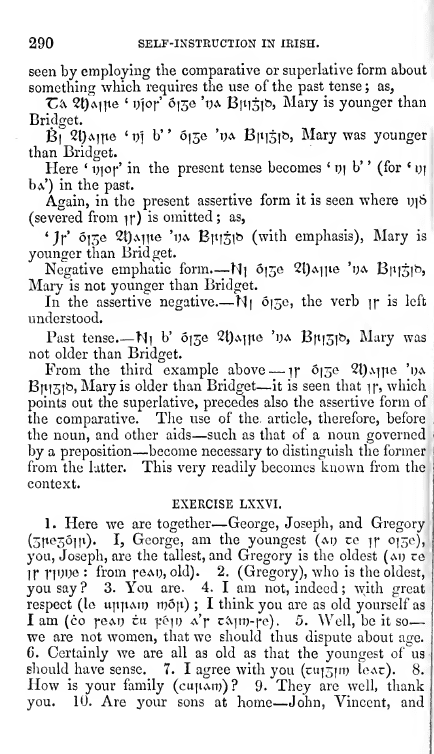
290
SELF-INSTEUCTION IN
IRISH.
seen
by
employing
the
comparative or
superlative form
about
something
which
requires the use of the
past tense
;
as,
"Civ
2t)<s]rie
'
^)]of
ó|5e
'v^
BjilSI^,
Mary is younger than
Bridget.
B|
2t)<v||ie
'
DÍ
b"
ó|3e
'i)a
B|ti5ib,
Mary
was
younger
than
Bridget.
Here
'
v]of
in
the
present
tense becomes
'
rji
b" (for
'
ij]
b<v') in the past.
Again,
in the
present
assertive
form it is seen where
i;i6
(severed
from
]y)
is
omitted
;
as,
*
jr'
ói^e
2t)v\iTte
'V'S
Btii5i!5
(with
emphasis), Mary is
younger than
Bridget.
Negative
emphatic
form
—
M]
oije
2t)A]]ie
't)A
BpjSl&j
Mary is not
younger than Bridget.
In the
assertive
negative.
—
U\
ó|5e,
the
verb
]y
is left
understood.
Past tense
'Ni
b'
5]5e
2t)Ai]te
't;^
13]X]'Sp,
Mary
was
not older than Bridget.
From
the
third example above
—
if
6156
2l)v\i]ie
't;A
Bfii3ib,
Mary
is
older
than Bridget—
it
is seen that
]y,
which
points
out
the
superlative, precedes also
the assertive form of
the comparative.
Tlie use
of
the. article, therefore, before
the
noun,
and other
aids—
such as that
of
a
noun governed
by
a
preposition—
become necessary to
distinguish
the
former
from
the
latter.
This very readily becomes
known from the
context.
EXERCISE
LXXVI.
1.
Here
we
are
together—George, Joseph, and Gregory
(3|te5ói|t).
I,
George,
am
the youngest
(ai;
ce
]]•
o]5o),
you, Joseph, are
the tallest,
and
Gregory is the oldest (v\i)
ce
ir
VV)^)^
'•
f^oii^
v^Ai),
old).
2. (Gregory),
who is the oldest,
you say ?
3. You are.
4.
I am
not, indeed
; with great
respect (lo
uitjiAir)
n7Ó|t)
;
I
think
you
arc as old yourself
as
I
am
(co
|*eAT)
cu ye^])
a']*
zii,]ro-ye)
.
5.
\Vell,
be
it
so
—
we
are not women, that
we
should
thus dispute about
age.
6.
Certainly
we are
all
as
old as
that
the
youngest
of'us
should
have sense.
7. I agree with
you
(cu]5]rT) leAc).
8.
How is
your
family (cu]i^n))
?
9. They
are well,
thank
you.
10. Are your sons
at
home—
John, Vincent, and
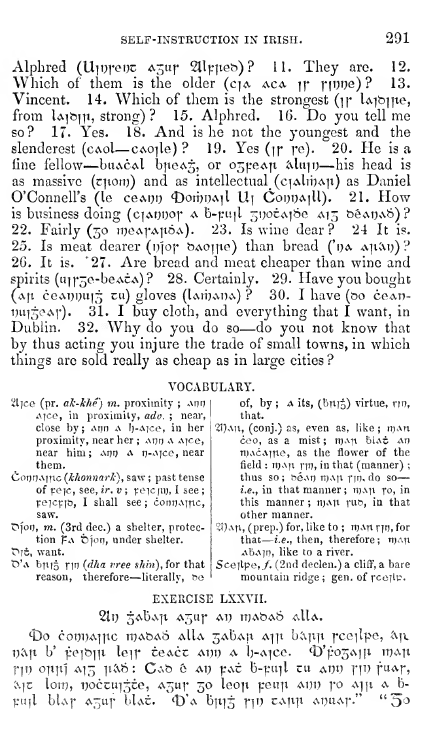
SELF-INSTRUCTION IN IRISH.
291
Alphred
(Uii)feuc
A3uí*
2llf
|ie&)
?
11. They arc. 12.
Which of them is the
older
(c]<v
ac<v
]y
y]r)Ve)?
13.
Vincent.
14. Which of them is
the
strongest
(]f
Uib]]ie,
from
Iai&jii,
strong)?
15. Alphred. 16.
Do you tell
me
so? 17. Yes.
18.
And
is he
not
the youngest and the
slenderest (caoI
—
c<\0]le)
? 19. Yes
(]y
ye).
20.
He is
a
fine
fellow—
btiACAl
biieA5,
or ojpeAji
ivlii]t)
—
his head is
as massive
(c]iorT))
and as
intellectual
(ciAlrb<\|t)
as Daniel
O'Connell's
(le ceAt;t)
i)orbi)A]l
U]
Coi)i)<vill).
21. How
is business doing
(cjAunoi*
a
b-inql
5i;ocA]óe
ai5
béAr)A6)?
22.
Fairly
(50
ri7eA|*A]aÓA). 23. Is wine dear? 24
It
is.
25. Is
meat
dearer
(n'jof
bAO]]ie) than bread ('i5<v
a^vívi;)
?
26. It is.
'27.
Are bread and meat
cheaper
than wine and
spirits
(u]f5e-beACA)?
28. Certainly. 29- Have
you bought
(Afi
ceAT)r)Uf5
en)
gloves (lArijAUA) ?
30.
I have (&o ceAP-
DuijeAf).
31. I
buy
cloth,
and
everything
that
I
want, in
Dublin. 32.
Why
do you do
so
—do you
not know that
by
thus acting
you
injure the
trade
of small
towns, in which
things are sold really
as
cheap
as
in large cities ?
VOCABULARY.
'il]ce (pr.
aJc-khf)
m.
proximity
;
aho
Aicc,
iu proximity, ado.
;
near,
close
by;
Arjn
a
b-A7ce,
in
her
proximity,
near her ;
Ann
a
Aice,
near
him; aiio
a
n-A]ce,
near
them.
ÓonPA]nc
{khonnark),
saw
;
past tense
of
V<^]C,
see,
ir.
v
;
vcic|n;,
I
see
;
reic^]&,
I
shall see;
conoAii^c,
saw.
t^fon,
m.
(3rd dec.) a
shelter, protec-
tion
pA
ójotj,
under shelter.
016,
want.
O'a
bni5
rifl
{dha nree shin), for that
reason,
therefore—
literally,
&o
of,
by
;
A. its,
(brijo)
virtue,
rjn,
that.
2T)An, (conj.) as, even as, like
;
njAn
ceo,
as
a
mist ; vi).\]\
blAc
at»
n)ACAine,
as the
flower
of
the
field
: itjAfi
vin,
in
that (manner)
;
thus so
;
béAT)
n).\\\
nn.
do so
—
i.e.,
in
that manner; ^r)^y\
yo,
in
this
manner
; njAn
ru»)
in that
other
manner.
"il^ATt, (prep.)
for, like to
;
tijAn
rin,
for
that
—
i.e., then, therefore
;
ttjati
AbAjn,
like
to
a
river.
Scejlpe,/.
(2nd
declen,)
a cliff,
a
bare
mountain ridge
;
gen.
of
rceilp.
EXERCISE
LXXVII.
2lr)
5AbA|i
Ajui*
Ai) njAbAÓ aUa.
<t)o
coi)nA]Ttc
TTjAbAÓ aUa 5AbAn
A^^x
bi\]i|i
fce^lpe,
^jv
i)iv]t b'
feibjii
\e-\x
ceAcc
at)1)
a
b-A^ce.
43'^05ai]i
n^A^t
|*]i)
oyvyi]
A^5
|tí\ó
:
Cv%b
6 aij -pAC
b-|:i!il
cu
a^i)
]'1U
f
«^r^
C\]c lon7, i}occu]5ce,
A^ut*
30
leo^t
yex\}i ai)i}
fo
a^ji
a b-
yix\\
blAf A^uf
bUc. í)'a
b]i]5
X]^
z^\]\]\
Ai)iiAf."
"
50
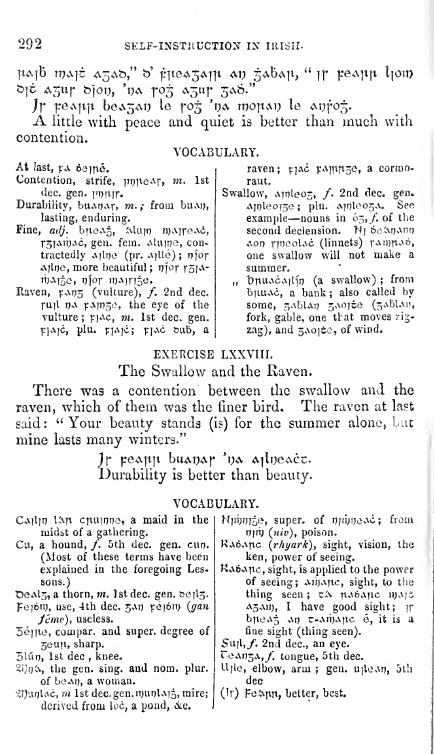
292
SKLF-INSTIIUCTION IN
TRISTI.
jiAib
njAjc
A5v\í5,"
b'
]:iteA3v\i|i
At)
5AbA]t,
*'
]]•
ye^]xp.
l]om
jf
feAjiji beA5AT)
le
1*05
't;a
TDoytAi) le
Ar)fo5.
A
little
with
peace
and quiet is better than
much
with
contention.
VOCABULARY.
cormo-
At last,
^A
óeifié.
Contention,
strife,
irp^teAr»
'"•
1st
dec.
gen.
in)tt|r.
Durability,
buArjAr, m. ; from
buAtj,
lasting,
enduring.
Fine,
adj.
b^teAs,
X\Ui]n njAireAc,
rsiAiipAc,
gen. fein.
Aluine,
con-
tractedly
ajItjo
(pr.
A]Ué)
; nfor
Ajltje, more
beautiful;
ijfof
fSiA-
")^I5«.
"for
iT^Airio^i-
Raven,
PA05
(vulture),
/.
2nd dec.
rujl
t)A
T:A]n5e,
the eye
of
the
vulture
;
i:|Ac, m. 1st dec.
gen.
^riAic,
plu.
FjAjc;
piAC
Sub,
a
raven;
}^]Ac
\\VWo<^>
rant.
Swallow,
Ainleo5, /.
2nd dec.
gen,
A]nleoi5e;
plu.
A]r)leo5A.
See
example
—
nouns
in
05,
/. of
the
second declension.
Wi
óo^^-^'^^
AOT)
rineolAc
(linnets)
tArnn'^ó,
one swallow will
not
make a
summer.
,,
'bnuACAilfn
(a
swallow)
;
from
b|uu\c,
a bank ;
also
called by
some, 5AulAr)
5^0)66
(5AblAi.i,
fork, gable,
one
that
moves
zig-
zag),
and
5Aoice,
of
wind.
EXERCISE LXXVIII.
The Swallow
and
the
Raven.
There was a contention between
the
swallow
and
the
raven,
which of
them
was the finer bird.
The
raven at
last
said:
"Your beauty stands (is)
for the
summer
alone,
bat
mine
lasts
many
winters."
Jp
|:eA]t|i
biiAr)A|* 'i;a
AilueACC.
Durabihty is
better than
beauty.
VOCABULARY.
CAjlin U\tt
cttuions,
a maid
in the
midst
of a
gathering.
Cu,
a
hound,
/.
5th dec.
gen. cun.
(Most of
these terms have
been
explained
in
the
foregoing
Les-
sons.)
t)eAl5,
a
thorn, m.
1st
dec.
gen.
feeils-
l^ejón),
use,
4th dec. 5A1)
Tréjóti)
(gan
feme),
useless.
Séjíie,
compar.
and super,
degree
of
5euti,
sharp.
3U'ini
1st dec
,
knee.
iVjij'c,
the gen.
sing,
and nom. plur.
of
bcAi),
a
woman,
^)ut)lAC,
m 1st
dec.
gen. njunlAia,
mire;
derived
from
loc,
a
pond,
«ic.
Yi]tr)t)-\le, super,
of
i^iiijijeAc;
from
i))rij
(niv), poison.
RAóATtc {rhyark),
sight, vision,
the
ken,
power of seeing.
Uaóa|xc,
sight, is applied
to the
power
of
seeing;
An^\tic, sight, to
the
thing
seen
;
civ
iiAóAtic
\x).\]t
A5Ain,
I have good
sight;
ir
btieA5 Ai) c-Aii)Ati>i
61
it is
^
fine
sight
(thing seen).
5uil,/. 2nd dec,
an
eye.
reA05A,/,
tongue,
5th
dec,
Ujle,
elbow, arm
;
gen.
ujleAp, 5tli
dec
(Ir)
Fe'A|ttt, better,
best.
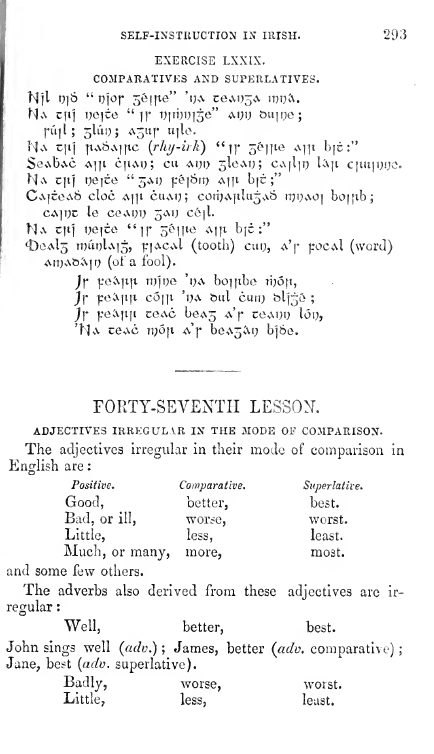
SELF-INSTUUCTION IN IRISH.
293
EXERCISE LXXIX.
COMPARATIVES AND SUPERLATIVES.
Mjl
r)]Ó
"
uíof
5é|fte"
'i;a
ceAi)5A
wvt\.
Ma
cut
ue]ce
"
i|*
r)in)i)15e"
At;i)
buirie;
rail;
slur);
A5ur
ujle.
l^vV
cii]
jtAOAiitc
[rhy-irk)
"
||*
5é]|ie
aju
bjc
:"
SeAbv\c
Ai|i
cftAt);
cu
ai)i) 5lev\T;;
CA|lir)
U\|i
cjiujijuo.
Nv\
cjii
r)eice
"5^,0
|:é]6ii)
Ajft
bic
;"
CAicevAÓ
doc
Ai|i
cuAt); coií)AjiIu5aó
rnuAO]
boifib;
CAi^c
le ceAt;i)
5AT)
cé)l.
Ma
z]\]
Deice
"n*
5énte
aiji
b]c
:"
í)eAl5
n)úf;lAi3,
t:|AcaI
(tooth)
cut;,
A'f
pcAl (word)
ArrjAbi^jT) (of
a
fool).
)X
-peaitfi
TDÍue
't?A
bo||tbe r\^ó]x,
)(*
feí^iiit
cofji
'í)A bill
cun; blí5ó
;
)X
fe<v]t[t
ccAc beA5
a'|*
csauu
lói;,
'Na
ceAC
njóft
A'f
beA5ÍM;
bjoc.
FORTY-SEVENTH LESSON.
ADJECTIVES
IRREGULAR IN THE MODE
OF
COMPARISON.
The adjectives
irregular
in their
mode
of
comparison in
English
are
:
Positive.
Comparative.
Superlative.
Good,
better,
best.
Bad,
or
ill,
worse,
worst.
Little,
less,
least.
Much,
or many,
more, most,
and some few
others.
The
adverbs
also derived from
these
adjectives
are ir-
regular :
Well,
better,
best.
John sings well
{adv.)
;
James,
better (adv. comparative)
;
Jane,
best
[adv.
superlative).
Badly,
worse,
worst.
Little,
less,
least.
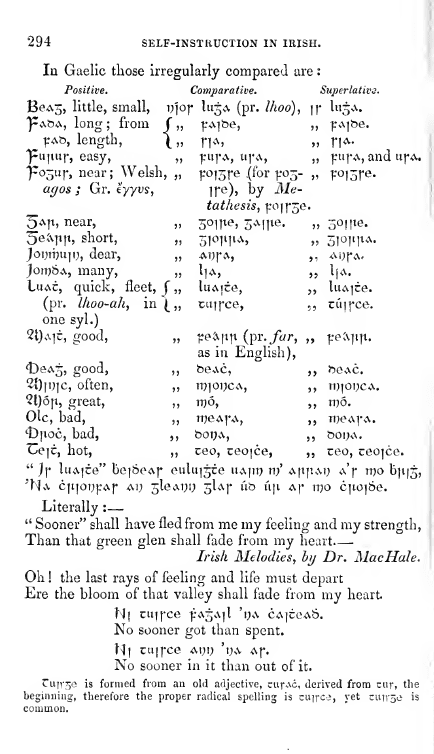
294
SELF-INSTRUCTION
IN IRISH.
In
Gaelic
those irregularly
compared are
:
Positive, Comparative. Superlative.
BeA3,
little,
small,
vioy
1115
v\ (pr. Ihoo),
]y
luJA.
pAbA,
long
; from
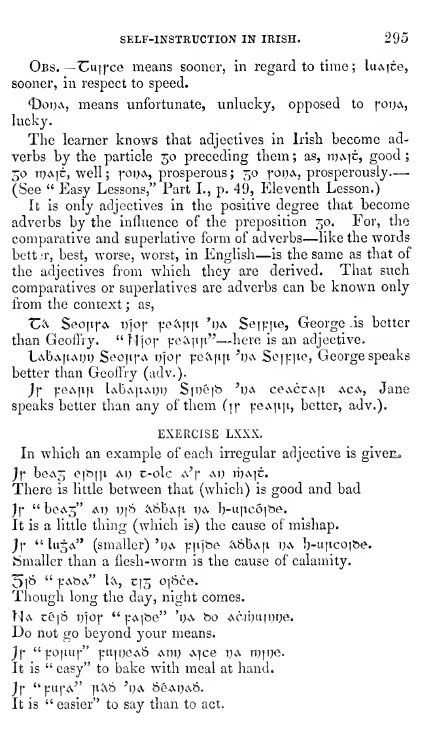
SELF-INSTRUCTION IN
IRISH.
295
Obs.
—
"Ciilfce
means sooner,
in regard to
time
; luAice,
sooner, in
respect
to
speed.
<t)oi;v\, means
unfortunate, unlucky,
opposed to
foi}<\,
lucky.
The learner
knows that
adjectives in
Irish become
ad-
verbs by
the
particle
30
preceding
them ;
as,
ttjaic,
good
;
50
rr)c^]t,
well
;
f
oi:)a, prosperous
;
30
foi)A,
prosperously
—
(See
"
Easy
Lessons," Part
I.,
p.
49,
Eleventh
Lesson.)
It is
only adjectives in the
positive
degree
that become
adverbs
by
the
influence of the
preposition
50.
For,
the
comparative and superlative
form of adverbs
—like
the
words
better, best, worse, worst, in
English—is the
same
as
that of
the
adjectives fi-om which they
are
derived.
That
such
comparatives or superlatives are
adverbs
can
be
known
only
from
the context
; as,
"Civ
SeojifA
i)io|*
^•eivftfi
'i)a
Seipjie,
George
.is better
than
GcoflVy.
"
f^jof
):ei\]\]%"
—here is an
adjective.
LAbAjtAi)!)
Sco|ii*A ]f]o\'-
]:ci\]\\i
'i;a
Self
fie,
George
speaks
better than
GeoiFry
(adv.).
)y
feAiifi
lAbA|iv\i)i;
Sii)&]fc»
^i)A
ceACCA|i aca,
Jane
speaks
better
than any of
them
(if
feA]iit,
better, adv.).
EXERCISE
LXXX.
In which an example of each
irregular
adjective is given»
)y
beA5
ep]]i ai?
c-olc a'^
ai)
rv<s]t.
There
is little between that
(which) is good
and
bad
jf
"
beA5"
AT)
T)i6
^6bA|i
t)A
b-nj^'^^l'^^*
It is a
little
thing (which
is) the cause
of mishap.
)Y
"
Iuja" (smaller)
'17
a
fitjbe
ívÓbAji
i;a lo-iqicope.
(Smaller than
a
flesh-worm is the cause
of calamity.
3)^5
"
f
AbA"
U\,
c]5
oi6ce.
Though long
the day,
night
comes.
Ma
C&16
T^iof
"
f
A]be"
'i;a bo
ACTbu|i)ue.
Do not
go beyond your means.
jf
"
foiiiif"
fuiueAÓ
Am) A^ce
rjA
n)]r)e.
It
is
"
easy" to bake with meal
at
hand.
jf
"fUfA^'
]tix6
^t)A
ÓéATJAÓ.
It
is
"easier'
to
say
than to
act.
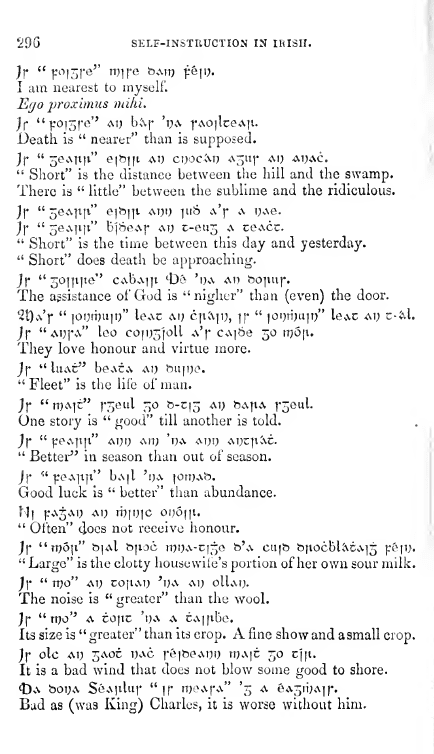
296
SELF-INSTRUCTION
IN IRISH.
jr
"
pi3r<^"
"^ir^
^^'^'^
^^i"?*
I am
nearest to myself.
Ego
proxhnus
milii.
If
"|:oi5|'e''
Ai)
bivf
'rjA
f<vo]lceA]t.
Death
is
"
nearer"
than
is
supposed.
jf
"
5eATin."
e]b]]i At) coocivp
Ajuf
At) aijac.
"
Short"
is the distance
between
the
hill and the swamp.
There is
"
little" between
the
sublime and the
ridiculous.
)f
"
Se^^T^li"
ejbiji
M)\)
iu6 A'f
A
t)Ae.
jf
"
5ev\^iii"
bjóeAr atj
c-eu5
a
ce<\cc.
"
Short"
is the
time between
this
day
and
yesterday.
"
Short"
does death be
approaching.
jr
"
SOII^lie"
CAbAi|i
4)6 't)A
At)
bo]auf.
The assistance
of God is
"nigher"
than (even) the
door.
2t)vvY
"
iot)tT)uir)"
leAC At)
c]ti\]i),
][*
"
ioi)rt)U]t)"
leAC
At)
c-ixl.
jp
"
AT)f
a"
leo
coii)5'|oll
a'i*
CA]6e
50
rí)ó|x.
They
love
honour and virtue
more.
)y
"
luAc" beACA Ai)
bii|i)e.
"
Fleet"
is
the
lii'e
of man.
jf
"tt)Aic"
rseul
50
b-c|5 At)
bAtiA
rS^ul.
One
story is
"
good"
till another
is told.
Jf
"
peA^tjl" At)t) Art) 't)A Al)t) At)C|li^C.
"
Better'^ in season than out
of
season.
jf
"
^eA]t|t"
bAjl
'!)A ]OfDAb.
Good luck
is
"
better"
than abundance.
H(
|:a5AI)
At)
n)]\)]C
ODOift.
"
Often"
d,oes
not receive honour.
jp
"rr>6|i"
biAÍ
bjioc
Tt)t)A-ci5e
bV
cuib bitocbl^éAi5
pejij.
'
"
Large"
is the clotty
housewiie's portion
of her own sour
milk.
jt*
"
rt)0" At)
COjXAt) ^l)A AI) ollAf).
The
noise
is
"
greater"
than
the
wool.
jf
"
T1)0'' A
COjtC
'l)A
A
CAjflbe.
Its
size is
"
greater"
than its crop.
A
fine
show
and asmall crop.
jf
olc At)
5AOC
i)AC
féjbeArx)
idaic
50
cifi.
It is
a bad
wind
that does not blow some
good
to shore.
<t)A
bOt)A
SeAJlluf
"if
rT)eAfv\"
'5
A
éA5ft)A|f.
Bad as (was
King)
Charles, it is
worse without
him.
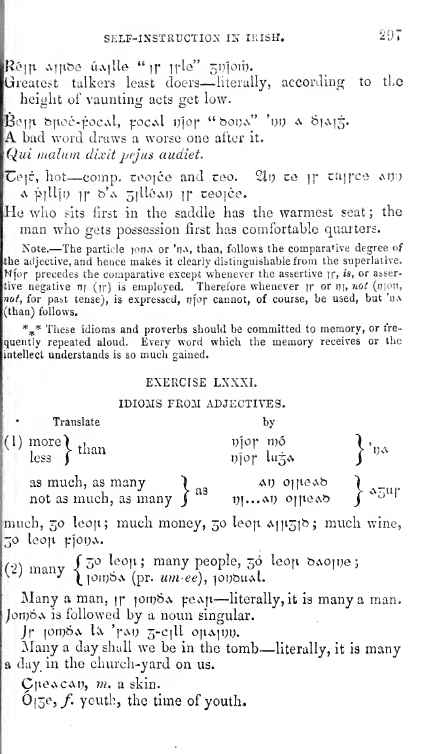
SELF-INSTRUCTIOS IK
IRISH.
^97
Rói|t
Ai|ibe iiAiUe
"if
]r\e"
31)10117.
Greatest talkers least
doers
—literally,
according
to tie
height
of
vaunting acts get
low.
Bcifi
b|tcc-^*ocAl,
^ocaI
vioy
"
&oi)a"
'iji)
^
^1^15«
A bad word
draws
a
worse
one after
it.
Qui malum
dixit pejus
audiet.
'Co]i, hot
—
comp.
ceojce and ceo. 2it)
ce
]X
cciifce
ai);;
A
p]U]ij
]p
b'A
5iUéAr}
if
ceo]ce.
He who
sits first in the saddle
has the
warmest
seat;
the
man
who
gets
possession first has
comfortable
quarters.
Note.
—
The particle jorjA
or 'oa,
than,
follows the
comparative
degree of
the adjective,
and hence makes it
clearly distinguishable
from
the
superlative.
Nfor
precedes
the comparative except
whenever
the
assertive
ir»
»'«.
or asser-
tive
negative
n|
(ir)
is employed. Therefore
whenever
ir
or
nj,
not
(njon,
not,
for past
tense),
is
expressed,
nfof
cannot, of
course, be
used,
but
'tjA
(than)
follows.
*^*
These idioms
and
proverbs should be
committed to
memory,
or fre-
quently
repeated aloud. Every word which the
memory
receives
or
the
intellect
understands is so
much gained.
EXERCISE
LXXXI.
IDIOMS FROM ADJECTIVES.
Translate by
(1)
more)
,,
tjior njó
")
,
^ '
, >
than J
'
,
. >
UA
less
) v}ox
li»5A
J
as
much,
as
many "I
At)
oifteAb
)
]
not as
much,
as
many
)
\)]..,m)
ojiteAb
/
-^5'M-
much,
50
leo|t;
much money,
50
leo|t
A]I15i&;
much
wine,
;o
leofi
fjOOA.
(•2)
many
Í
^*^
^"^^^^
'
"""^"^ people,
30
leo|i
ftAOjue;
^
''
•'
\ioiT)bA (pr. umee),
iot)biiAl.
Many a
man,
if
iotdSa
^eA]t
—
literally,
it is many a man.
jorT)6v\ is
followed
by a noun
singular.
jf
iorT)ÓA
lev
'fAt)
3-C1U
oitAiui;.
Many a
day shall
we
be in
the
tomb
—literally, it is many
a
day
in the
church-yard
on
us.
CfteACAtj,
m.
a skin.
Ó|5^>/'
youth,
the time of
youth.
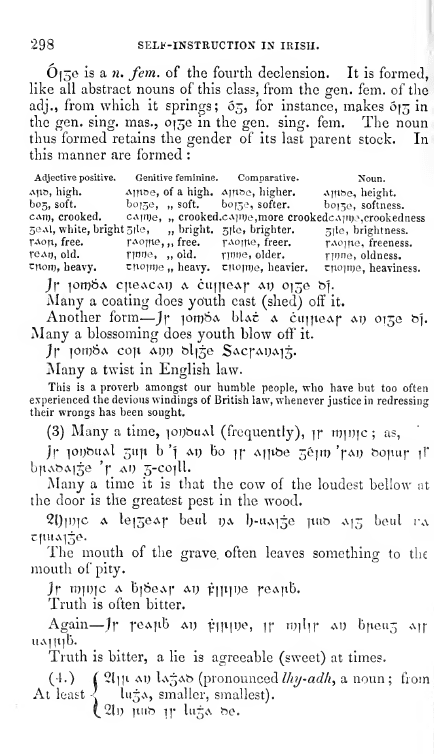
298
SELF-INSTRUCTION
IN IRISH.
Oi5e
is
a
Ji.
fern,
of
the
fourth
declension.
It is
formed,
like all abstract nouns of this class,
from
the
gen.
fern,
of
the
adj., from which it springs;
05,
for instance,
makes
ó|5
in
the
gen. sing, mas.,
0136
in the gen. sing.
fem.
The noun
thus formed retains the
gender
of
its last
parent
stock. In
this manner are formed :
Adjective positive.
Genitive feminine. Comparative.
Noun.
Alt»,
high.
Ain&e,
of a
high.
Ajtt&e,
higher.
Ajiibe, height.
bo5,
soft. boi5e,
„
soft.
boi5e, softer.
boi5e,
softness.
CAtij,
crooked,
CA|itje,
„
crooked.Cv\)nje,more
crookedcAjn^^jCrookedness
SeAl,
white, bright 3ile,
„
bright,
sjle,
brighter.
sjle,
brightness.
TAOfx, free.
r^o]yie,
„
free.
r^voifte,
freer.
r-\oitie,
freeness.
reAij,
old.
rifje,
,,
old.
rinne,
older,
rinne,
oldness.
cnon),
heavy.
zr\o]n)e
„
heavy, cnojnje,
heavier.
ctxoin^e,
heaviness.
)y
Ton76v\
c|tev\CAi)
a
cu]\xei^y
ai)
oije
b].
iMany
a
coating
does youth cast
(shed)
off it.
Another form
—
Jf
pn^OA bU\é
a
cui|teAf*
Atj
0150
b).
Many a
blossoming
does youth
blow off"
it.
jf
]on)6A co]i Ai)i)
blije Sac|*ai)ai5.
Many
a
twist in English law.
This is a
proverb
amongst
our humble
people,
who
have but
too
often
experienced
the devious
windings
of British law,
whenever
justice
in
redressing
their wrongs has been sought.
(3)
Many a time,
ioi^&uaI (frequently),
]y
n^jOjc
;
as,
jf
TOi)buAl
5u|i b
'i
AT) bo
]f
A||tbe
^é\n)
'yA\)
bo^iuy
ji'
b|tA&<xi5e
'y
At)
5-co^ll.
Many
a
time it is
that
the
cow of the loudest
bellow
at
the door
is the
greatest
pest
in
the
wood.
2l)|i)]C
A
le|5eA|*
beul
i;<v
b-uAi5e
itub
a|5
beul
i;a\J
cituAi5e.
The
mouth of the
grave, often
leaves something
to
the
mouth
of pity.
Jr
rr)|i)jc
A
bjOcAf
Ai)
vilM'^^
r^Aitb.
Truth is often bitter.
Again
—
]y
ye^]ih
ai)
y\]x]f)e,
]y
w]\]y
ad
biteii3
Aif
uAiitib.
Truth is bitter,
a lie is
agreeable (sweet)
at
times.
(4.)
(
2I111
AT)
lA5Ab
(pronounced
/Ay-arf/i,
a
noun
;
from
At least
<
i«5<^j smaller,
sjuallest).
(,2li)
jiub
1]*
luJA
be.
